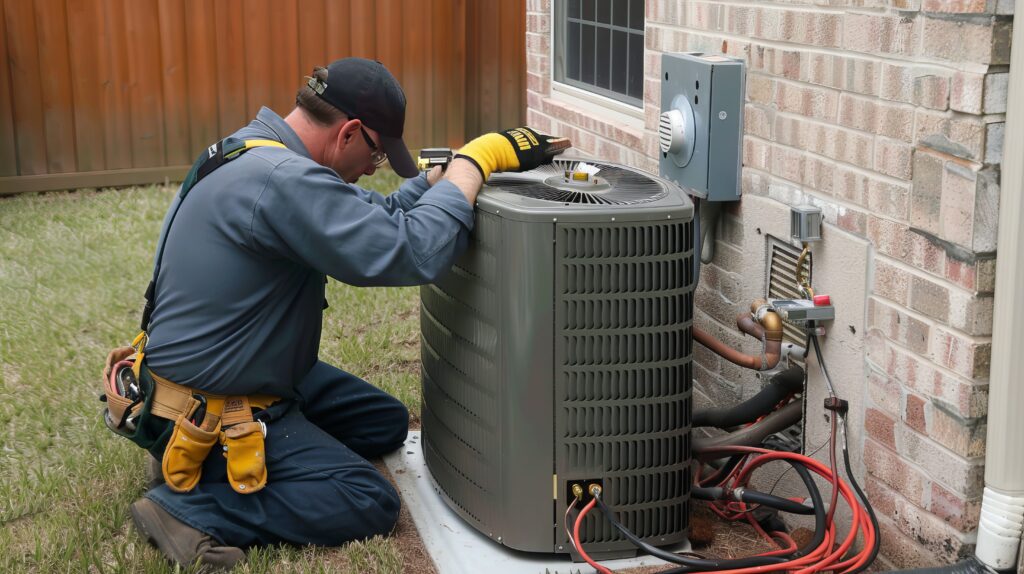Knowing whether your AC is bad is crucial to maintaining a comfortable home. Recognizing the signs of a failing air conditioner early can save you from the discomfort of a breakdown and the expense of major repairs.
Signs Your AC Might Be Going Bad
One of the most obvious signs that your AC might be bad is if it’s blowing warm air. If you’ve set your thermostat to cool, but warm air is coming out of your vents, this is a clear indication that something is wrong. This could be due to a variety of issues, such as a refrigerant leak, a malfunctioning compressor, or a problem with the thermostat. Warm air is a sign that your AC is struggling to perform its basic function, and it’s time to get it checked out.
Another sign is if your AC is making strange noises. While air conditioners aren’t completely silent, unusual sounds like grinding, squealing, or banging are not normal. These noises often indicate that a part inside the unit is worn out or loose. Ignoring these sounds can lead to more severe damage over time, so it’s essential to have them inspected as soon as possible.
High humidity levels in your home are another red flag. Your AC is designed not only to cool your home but also to remove excess humidity from the air. If you notice that your home feels more humid than usual, it could be a sign that your AC isn’t working correctly. This issue can lead to discomfort and even mold growth if not addressed promptly.

Common Problems That Indicate a Bad AC
Frequent cycling is a common issue that might suggest your AC is bad. If your air conditioner is constantly turning on and off without cooling your home effectively, it’s a sign that something is wrong. This could be due to an oversized unit, a failing thermostat, or other underlying issues. Frequent cycling not only puts additional wear and tear on your system but also leads to higher energy bills.
Another problem to watch for is poor airflow. If you notice weak or reduced airflow coming from your vents, it could indicate a problem with the compressor, ductwork, or even a clogged air filter. Poor airflow means your AC is working harder to cool your home, which can lead to system breakdowns and increased energy consumption.
A bad smell coming from your AC is also a sign of trouble. Musty odors can indicate mold growth inside your unit or ductwork, while a burning smell could suggest a problem with the wiring or electrical components. These issues should be addressed immediately to prevent health risks or further damage to your AC system.
When to Consider Repairing or Replacing Your AC
If your AC is experiencing any of the issues mentioned above, it’s important to consider whether repair or replacement is the best option. One factor to consider is the age of your system. Most air conditioners last between 10 to 15 years. If your unit is approaching or has exceeded this age, it may be more cost-effective to replace it rather than continue with frequent repairs.
Additionally, if your energy bills have been steadily increasing without a change in your usage, it could indicate that your AC is no longer operating efficiently. Older systems tend to lose efficiency over time, which leads to higher energy costs. In this case, upgrading to a new, more energy-efficient unit could save you money in the long run.
Frequent repairs are another sign that it might be time to replace your AC. If you find yourself calling a technician multiple times a year for various issues, those repair costs can quickly add up. At some point, replacing the unit may be more economical and provide better comfort and reliability.
- Consider the age of your system: AC units over 10-15 years old are more likely to experience frequent issues and may be better off replaced.
- Evaluate energy costs: Rising energy bills without increased usage often indicate declining efficiency, signaling it might be time for an upgrade.
- Track repair frequency: Multiple repairs each year suggest your system is deteriorating, and replacement could be more cost-effective.
- Assess comfort levels: If your home isn’t as comfortable as it used to be, despite regular maintenance, your AC might be failing.
Get Professional Assessment for Your AC
If you’re unsure whether your AC is bad or just in need of a tune-up, it’s best to get a professional assessment. A certified HVAC technician can diagnose the problem and provide you with the best course of action, whether that’s repair, maintenance, or replacement.
When you need expert advice on the condition of your AC, Apple AC & Heat Services is here to help. Our experienced technicians can assess your system’s performance, identify any issues, and recommend the most cost-effective solutions. Contact us today to schedule an inspection and ensure your home stays comfortable and cool.



